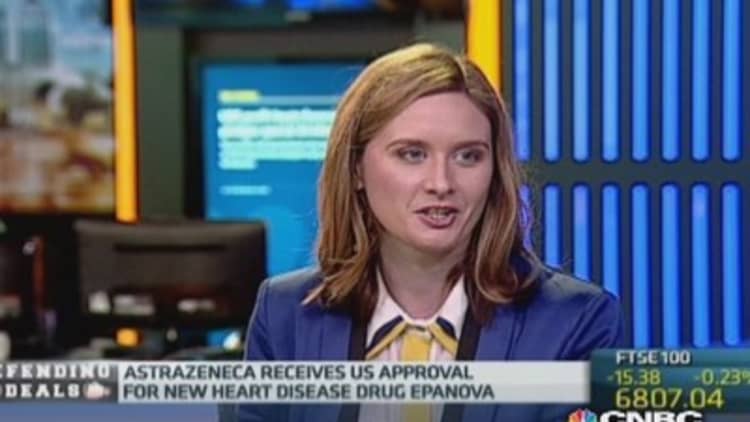
AstraZeneca, the U.K. pharmaceutical company fighting off repeated approaches from larger rival Pfizer of the U.S., has boosted its defense against the raid by unveiling plans to nearly double revenues to $45 billion by 2023.
Earlier on Tuesday, the U.K. company announced the earlier-than-expected approval of a drug based on fish oil.
The British company will also use its promising pipeline of cancer drugs to bolster its defense against an expected third approach from Pfizer, the world's biggest pharma company.
Pascal Soriot, chief executive of AstraZeneca, said in a statement: "AstraZeneca is completing its transformation, and now has the right size, focus and team to deliver on one of the most exciting pipelines in the pharmaceutical industry."
On Tuesday morning, AZ announced that Epanova, which treats a condition called hypertriglyceridaemia that involves having high levels of fatty molecules in your blood, had been approved by the U.S. Food and Drug Administration.
Read MoreWhy Pfizer is intent on another dose of AstraZeneca
Epanova is unlikely to be the only shot in the arm AZ needs to fend off Pfizer. The drug is forecast to have annual sales of $200 million in 2018 by Deutsche Bank analysts, a respectable figure but far below the $1 billion annual sales commanded by some "blockbuster" drugs.
This is reflected in the U.K. company's share price, which fell in early London trading.
Read MoreWhy Pfizer's bid is 'inadequate': AstraZeneca
AZ has also released an update on its pipeline, focusing on development of immuno-oncology drugs, a relatively new way of treating cancer.
While medicines from this pipeline are not forecast to become part of AZ revenues until 2017 or later, they are expected to deliver even more in sales than analysts forecast, according to AZ. For example, MEDI4736, one of the drugs bought when AZ acquired MedImmune in 2007, is now expected to fetch around $6.5 billion annually, compared to analyst estimates of $2-$7 billion.
The announcement came after Pfizer Chief Executive Ian Read said he was "very disappointed" by the AstraZeneca board's refusal to engage with Pfizer over its improved $106.5 billion bid for the company. Last Friday, the U.S. company raised its January offer of £46.61 a share to £50 and increased the cash component to around 32 percent from 30 percent earlier.
Read MorePfizer sales way off mark as company pursues AstraZeneca
Pfizer now has less than three weeks to come back with a higher offer.
Read and Soriot are both expected to be grilled by U.K. lawmakers next week over the potential takeover and its consequences for U.K. science jobs.


